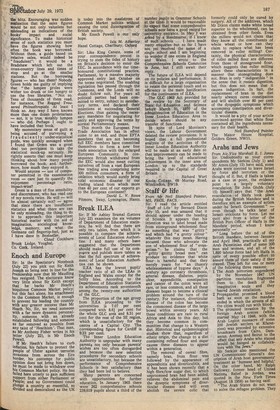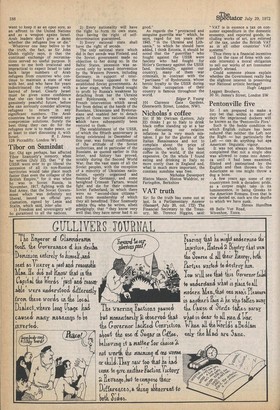Arabs and Jews
From Air Vice Marshall R. I. Jones Sir: Undoubtedly as your correspondents Mr Sarkiss (July 1) and Mr Amos (July 15) have said, some Arabs were coerced to leave Israel by force and terrorism or the thought of it. But, if Haifa is taken as a case in point, the evidence point to a largely voluntary evaculation. Sir John Glubb (July 15) himself says that "the Arab evaculation of Haifa took place during the British Mandate and is therefore not an example of action under he Israeli Government" — even though he talks later of Israeli evictions by force. Let me quot also from a letter of the British Port Officer of Haifa in the Mandate period, whom I know personally —
"Long before the nd of the British mandate, between January and April 1948, practically all my Arab Palestinian staff of some 200 men and women, and all of the 1,800 labour force had left Haifa in spite of every possible effort to assure them of their safety if they stayed. They left for one or more of the following three reasons: 1 The Arab terrorism engendered by the November 1947 UN partition resolution frightened them to the death of the imaginative souls and they feared Jewish retaliation. 2 Propagandist promised a blood bath as soon as the mandate ended in which the streets of all the cities would run with blood. 3 The promised invasion by the foreign Arab armies (which started May 14 1948, with the Arab Legion massacre of some 200 Jewish settlers at Kfaretzion) was preceded by extensive broadcasts from Cairo, Damascus, Amman and Beirut to the effect that any Arabs who stayed would be hanged as collaborators with the Jews." Mr Sarkiss also mentioned the UN Commissioner General's description of Arab host governments' treatment as 'humane and helpful.' On the other hand, Mr Ralph Galloway, former head of United Nations Relief in Jordan, was quoted in the New York Times (August 18 1958) as having said: "The Arab States do not want to solve the refugee problem. They want to keep it as an open sore, as an affront to the United Nations and as a weapon agains Israel. Arab leaders don't give a damn whether the refugees live or die."
Whatever one may belive to be the truth, the fact, as Sir John Glubb rightly says, is that the continual exchange of recriminations served no useful purpose. It seems to me both irrational and impractical to expect Israel to take back large numbers of Arab refugees from countries who continue to maintain a state of war with her, and who have for years indoctrinated the refugees with hatred of Israel. Clearly Israel must be given some confidence that she can look forward to a genuinely peaceful future, before she can seriously consider allowing refugees to return in any significant numbers. The Arab countries have so far resisted any compromise solutions. Surely the best thing they can do for the refugees now is to make peace, or at least to start discussing it, with
Israel. R. I. Jones 128 Piccadilly, London W1 'Tibor on Samodat
Sir: Old age perhaps, has affected Tibor Szamuely's memory, when he writes (July 22), that "if the USSR were ever to go liberal the secession of all its non-Russian territories would take place much faster than even the collapse of the British Empire," for it was when he was in Soviet Russia, in November, 1917, fighting with the Red Army, that the Soviet Government which was definitely not liberal, issued an official proclamation, signed by Lenin and Stalin, which said, inter alma: 1) Freedom and sovereignty will be guranteed to all the nations, 2) Every nationality will have the right to form its own state, thus having the right of selfdetermination guaranteed.
3) Every national state shall have the right of secede.
The only national state which did in fact secede was Finland, and the Soviet government made no objection to her doing so. In the Baltic States, secession was secured only by armed intervention by the Western Powers, including Germany, in support of international forces opposed to the established Soviet governments. At a later stage, when Poland sought to profit by Russia's weakness by detaching from her the Ukraine and Byelorussia, it was only French intervention which saved her from defeat at the hands of the Russians, Ukrainians and Byelorussians and enabled her to detach parts of those two national states which have subsequently been restored to them.
The establishment of the USSR, of which the fiftieth anniversary is being celebrated in December of this year, was formal confirmation of the attitude of the Soviet authorities, and in particular of the Russians, as quoted earlier in this letter, and history has proved, notably during the Second World War, that the vast mass of all the Soviet peoples, with the exception of a minority of Ukrainian nationalists, openly organised and financed by Germany, and some benighted Crimean Tartars, would fight and die for their common Soviet Fatherland, in which there were no " second-class citizens " and from membership of which they all benefitted. Tibor Szamuely admits this whn he writes, albeit grudgingly, that "they know very well that they have never had it so good."
As regards the "protracted and sanguine guerrilla war" which, he says, raged for ten years after 1945, "in the Ukraine and Lithuania," to which he should have added, I think Estonia, it should be noted that the "guerrillas " who fought against the USSR were fascists who had fought for Hitler's Germany against the USSR rand, incidentally, against our country), many of them war criminals, in contrast with the " partisans " of Byelorussia, whose heroic loyalty to the USSR during the Nazi occupation of their country is famous throughout the world.
Edgar P. Young 101 Clarence Gate Gardens, Glentworth Street, London, NW1.









































 Previous page
Previous page